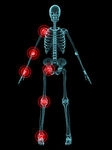Like NateS,
I'm confused as to whether "NeverAgain" and allenc3 are the same person or not.
And I'm confused as to what NeverAgain's whole issue is---beyond an adamant insistence that there is no way NeverAgain could possibly ever have OSA and therefor, in a leap of illogical reasoning that defies the mind, the whole OSA/CPAP stuff is a sham and we the folks who have learned how to sleep with this machine AND benefit from it are all somehow suckers ....
I'm also confused on these issues:
How does orthopedic surgery lead to weight gain????? How does orthopedic surgery lead to
enough weight gain to qualify for gastric bypass surgery????
Why would any doctor OK gastric bypass surgery as the
primary treatment for insulin intolerance????? Or, as seems reasonable, is the hope that gastric bypass surgery will likely positively affect the insulin intolerance problem as a side benefit to its real purpose of helping NeverAgain lose a tremendous amount of weight that he's been unable to lose through diet, exercise, and other lifestyle changes?????
I write the rest of this not so much for NeverAgain's benefit: He seems determined to wallow in a pool of self denial on several medical issues.
I write the rest of this because it is rather probable that other folks contemplating gastric bypass surgery who have been required to undergo a PSG to test for OSA will stumble on our little forum and NeverAgain's posts. And I felt that it best to make sure there was a response with responsible links pointing to the necessity of
not denying the OSA problem if it was discovered in the testing required to qualify for gastric bypass surgery.
Gastric Bypass surgery is serious stuff. And the criteria to qualify for gastric bypass surgery are pretty stringent. According to
http://www.webmd.com/diet/weight-loss-s ... ric-bypass,
Weight-loss surgery is suitable for people who are severely overweight and who have not been able to lose weight with diet, exercise, or medicine.
Surgery is generally considered when your body mass index (BMI) is 40 or higher. Surgery may also be an option when your BMI is 35 or higher and you have a life-threatening or disabling problem that is related to your weight, such as type 2 diabetes that is difficult to control with diet, exercise, and medicine.
It is important to think of this surgery as a tool to help you lose weight. It is not an instant fix. You will still need to eat a healthy diet and get regular exercise. This will help you reach your weight goal and avoid regaining the weight you lose.
To put this in perspective: I am 5'1" tall. In order for me to have a BMI of 40, I would need to weigh at least 211 pounds, almost twice what I currently weigh (107 lb). A man of averagish height---let's say 5' 10'' would have to weigh 278 pounds to have a BMI of 40. Of course some folks qualify for gastric bypass surgery because they have a comorbid condition such as type 2 diabetes (that is typically not well controlled) AND and a BMI of 35 to qualify for gastric bypass surgery. A man of average height (5'10") would need to weigh about 243 pounds to have a BMI = 35.
And morbid obesity is a prime risk factor for OSA. Even when the person seemingly has no apparent symptoms of OSA. (And while the corrolation between OSA and obesity is clear, the
causation aspect is not well understood: In some folks, the OSA predates the weight gain and may lead to the weight gain; in others, the weight gain may trigger the OSA.)
Moreover, it's known that gastric bypass patients with UNTREATED OSA have much higher complication and mortality rates than those without OSA or those with treated OSA. Hence most surgeons who perform gastric bypass surgery will not perform it until after a patient has been screened for OSA and, if the sleep test is positive, the surgeon may require proof that the person is indeed compliant with CPAP therapy for several weeks or months before scheduling the surgery in order to minimize the increased risks of the surgery. And this is true even when the hope is that the patient's OSA will be reduced or eliminated by the significant weight loss from the surgery, the surgeon will still insist on treating the OSA with CPAP before the surgery. (For example see
http://www.1gastricbypass.com/osa.htm,
http://voices.yahoo.com/obstructive-sle ... 18849.html, and
http://www.nursingcenter.com/library/Jo ... _ID=594215 for example).
And so gastric bypass surgery, while it is a godsend for many of the folks who undergo it, is not for the faint of heart or for those who are looking for quick fixes: It is significant surgery that carries the risk of serious complications---particularly for those with untreated OSA. The diet restrictions on the folks who undergo this surgery last for life. While the types of food the patient is allowed to eat (long term) may not be overly restricted, the
quantity of food that can be eaten at any one meal remains restricted for life. And because of what's actually done to you in gastric bypass surgery, you have a lifelong commitment to making extra sure that your (small) meals contain the proper minerals and vitamins in sufficient quantities:
In a gastric bypass, the part of the intestine where many minerals and vitamins are most easily absorbed is bypassed. Because of this, you may have a deficiency in iron, calcium, magnesium, or vitamins. This can lead to long-term problems, such as osteoporosis. To prevent vitamin and mineral deficiencies, you may need to work with a dietitian to plan meals, and you may need to take extra vitamin B12.













